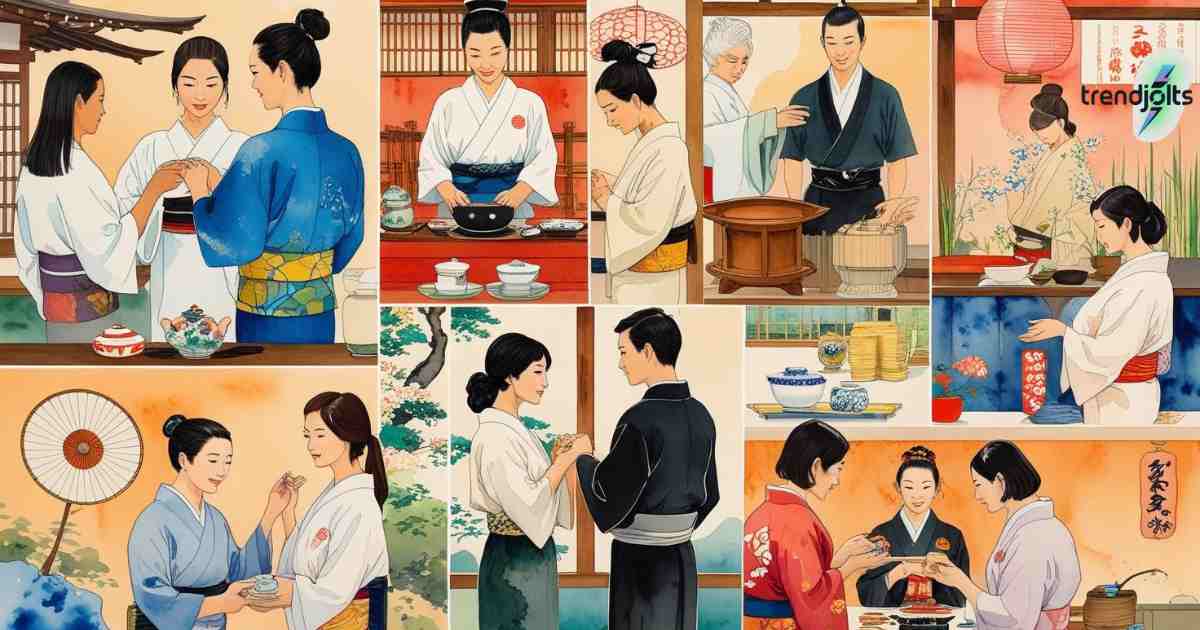Ever wondered why your perfectly pronounced 「ありがとう」 left that Japanese person looking uncomfortable? You’re not alone! Learning Japanese goes far beyond memorizing kanji and mastering verb conjugations, it’s about cracking the secret code of Japanese culture. Without understanding these invisible rules, even advanced learners stumble into awkward silences that feel like eternity.
Here’s the truth: Japanese communication is like an iceberg where 90% stays hidden beneath the surface. Cultural nuances determine whether you sound like a respectful visitor or an accidental bulldozer. This guide reveals the unspoken rules that transform textbook knowledge into genuine connection. You’ll discover why humility beats confidence, how silence speaks volumes, and why apologizing works like social magic in Japanese society.
Why Culture is the Key to Learning Japanese
Learning Japanese isn’t just memorizing kanji or perfecting verb conjugations, it’s unlocking a world where words carry invisible meanings. Think of Japanese culture as the secret decoder ring you never knew you needed. Without it, you’re basically trying to navigate Tokyo with a map of New York. Cultural awareness transforms awkward encounters into meaningful connections, turning linguistic proficiency into genuine communication mastery.
High-context language means everything you don’t say matters just as much as what you do. Unlike English, where directness rules supreme, Japanese communication thrives on subtlety and implication. You’ll discover that social customs shape every conversation, from business meetings to casual chats. Master these unspoken rules, and you’ll sound like a native speaker who truly gets it. Miss them, and even perfect grammar won’t save you from those uncomfortable silences that feel like eternity.
The Art of Deflecting Compliments: Why “Thank You” Feels Wrong
Picture this scenario: Someone praises your Japanese language skills with 「日本語が上手ですね!」 and you beam back 「ありがとう!」 Suddenly, the air feels thick with awkwardness. What just happened? You’ve accidentally committed a cultural faux pas that screams “I don’t understand Japanese society” louder than a tourist with a guidebook. Accepting praise directly contradicts the fundamental principle of 謙遜 (kenson), where humility reigns supreme over self-congratulation.
Deflecting compliments isn’t about being fake—it’s about maintaining social harmony. When you gracefully redirect praise, you’re showing respect for the delicate balance that keeps Japanese culture running smoothly. This communication pattern extends far beyond language learning into every aspect of daily life. You’re not just learning phrases; you’re adopting a mindset that values collective well-being over individual recognition. Think of it as an emotional aikido redirecting force rather than meeting it head-on.
Why Directly Accepting Praise Feels Unnatural

Japanese cultural expectations make accepting compliments feel like wearing shoes in someone’s house, technically possible but deeply uncomfortable for everyone involved. Western cultures celebrate self-confidence and personal achievement, but Japanese society views direct acknowledgment of praise as borderline arrogant. It’s like showing up to a black-tie event in flip-flops; you’re not breaking any laws, but you’re definitely breaking social codes that matter more than written rules.
How to Respond to a Compliment in Japanese
Transform those awkward moments into graceful exchanges with these humble responses:
「いえいえ、まだまだです」 (I still have so far to go),
「そんなことないです」 (That’s not true at all),
「勉強中です」 (I’m still learning).
These phrases work like social lubricant、 keeping conversations flowing smoothly while demonstrating your understanding of Japanese etiquette. Pro tip: pair these responses with a slight bow and watch how native speakers visibly relax, recognizing you as someone who truly grasps cultural nuances.
Humility vs. Bragging: Why Modesty is Expected
Western cultures often treat self-promotion like a necessary skill, think LinkedIn updates celebrating personal victories or parents proudly sharing their children’s achievements. But step into Japanese professional settings with that same energy, and you’ll feel like you’re speaking through a megaphone in a library. Modesty isn’t just preferred; it’s the social glue that prevents confrontation and maintains that precious 和 (wa) everyone keeps talking about.
Boasting, even unintentionally, disrupts this carefully maintained equilibrium. Cultural sensitivity demands understanding that success belongs to the group, not the individual. When you receive praise for a project, claiming personal credit feels like stealing from your teammates’ contributions.
Japanese society operates on collective achievement, where individual brilliance is acknowledged through understated recognition rather than spotlight moments. This philosophy extends from corporate boardrooms to family dinners, creating a culture where humility becomes the highest form of strength rather than weakness.
How Humility Works in Japan
Watch this fascinating contrast unfold: Western parents might announce “My child won the national competition!” while Japanese parents respond with
「いえいえ、運が良かっただけです」 (They were just lucky).
This isn’t false modesty—it’s a genuine belief that individual success stems from community support, good fortune, and circumstances beyond personal control. Professional environments mirror this approach; instead of claiming ownership of achievements, colleagues deflect credit with phrases like
「皆さんのおかげです」 (It’s thanks to everyone’s help), maintaining team harmony while acknowledging collective effort over individual brilliance.
The Delicate Dance of Apologies: Why “Sorry” is Overused in Japan
Apologizing in Japan transcends mere fault admission—it’s linguistic oil keeping social interactions running smoothly. You’ll hear 「すみません」 everywhere, from crowded trains to convenience stores, creating a symphony of politeness that might baffle newcomers. This isn’t weakness; it’s a sophisticated social lubricant that prevents friction before it starts. Japanese culture treats apologies like verbal bows, showing respect and maintaining harmony even when nobody did anything wrong.
Strategic apologizing reflects deeper cultural values where collective comfort outweighs individual pride. Think of 「すみません」 as a Swiss Army knife of Japanese communication, it works as “excuse me,” “thank you,” and “I’m sorry” depending on context. Native speakers instinctively know when to deploy this versatile phrase, using it to navigate everything from declining invitations to acknowledging someone’s effort. Master this cultural nuance, and you’ll sound less like a textbook and more like someone who truly understands Japanese society.
Common Situations Where Apologies Are Expected
「すみません」 becomes your go-to response when bumping into someone on Tokyo’s packed sidewalks—forget “excuse me” and embrace this polite declining tool.
Receiving help triggers another apology opportunity; instead of just saying thank you, acknowledge the effort someone made with 「すみません」, showing you recognize their inconvenience.
Declining invitations requires delicate handling—direct “no” sounds harsh, so soften rejection with 「ちょっと…」 followed by apologetic undertones that preserve everyone’s dignity while maintaining social customs.
Indirect Speech: Why Saying “No” is Avoided
Direct rejection cuts through Japanese communication like a chainsaw through silk—technically effective but culturally devastating. Saying “no” outright violates the unwritten code of social harmony, potentially causing embarrassment that lingers long after conversations end. Indirect refusals serve as conversational airbags, softening impact while preserving relationships that matter more than immediate clarity. You’re not being dishonest; you’re being culturally intelligent.
Western directness often feels like emotional bulldozing to Japanese sensibilities, where subtlety reigns supreme over blunt efficiency. Indirect communication patterns create space for face-saving retreats, allowing everyone to maintain dignity while navigating disagreement.
Think of it as conversational chess rather than verbal wrestling, strategic moves matter more than brute force. Advanced learners recognize these speech patterns as sophisticated tools for maintaining professional relationships and personal connections simultaneously.
How Indirect Rejections Work in Japanese
Transform potentially awkward rejections into graceful deflections with phrases like 「今日はちょっと…」 (Today is a little…), leaving the inconvenience implied rather than stated.
「考えておきます」 (I’ll think about it) buys time while signaling gentle disinterest—smart native speakers understand this rarely means actual consideration.
「難しいですね…」 (That’s difficult…) works like a conversational parachute, allowing soft landings from unwanted commitments while preserving social etiquette that keeps relationships intact.
Silence as a Response: The Power of Pauses in Japanese Communication

Meaningful silence in Japanese conversations carries weight that words can’t match—it’s not awkward dead air but thoughtful consideration in action. Western cultures often rush to fill quiet moments, mistaking pauses for communication breakdowns rather than respectful processing time.
Japanese colleagues use thoughtful pauses like punctuation marks, creating space for careful consideration before responding. Don’t interrupt these moments; embrace them as signs of respect and intellectual engagement. Strategic silence becomes a powerful negotiation tool, allowing participants to avoid rushed decisions that might damage relationships later.
Group settings reveal silence’s true complexity—quiet doesn’t equal agreement but might indicate thoughtful disagreement without direct confrontation. Respectful communication means recognizing when someone needs processing time rather than immediate responses. These pauses demonstrate cultural sophistication that advanced learners appreciate as markers of genuine linguistic proficiency beyond mere vocabulary mastery.
When Silence is Meaningful
- Conversational pauses signal careful thinking rather than confusion—your Japanese colleague isn’t stuck but showing respect through deliberate consideration. Business negotiations transform silence into strategy, where patient waiting often yields better outcomes than aggressive pushing for immediate answers.
- Group discussions reveal silence’s nuanced meanings; not speaking up doesn’t always indicate agreement but might represent thoughtful disagreement expressed through respectful non-participation, maintaining cultural awareness while avoiding unnecessary confrontation that disrupts social harmony.
Final Thoughts: Why Cultural Awareness is Essential for Learning Japanese
Mastering Japanese culture transforms you from a textbook learner into someone who truly connects. These cultural nuances aren’t just nice-to-know extras, they’re essential keys that unlock authentic Japanese communication. You’ll navigate social situations with confidence, understanding why humility matters more than perfect grammar.
Remember, learning Japanese means embracing a completely different worldview. Native speakers appreciate foreigners who respect their cultural values through indirect speech, strategic apologizing, and meaningful silence. Start practicing these insights today, and watch your Japanese language skills flourish beyond mere vocabulary into genuine cultural fluency.










